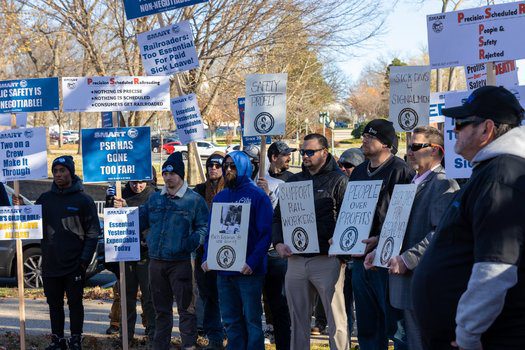On Tuesday, union members and lawmakers rallied on Capitol Hill to pressure Congress to support workers, by better funding the agency set up to protect them.
The National Labor Relations Board has been flat-funded since 2014 – and with inflation, the agency says that amounts to a 25% budget decrease. Sara Steffens, secretary-treasurer for the Communications Workers of America, says as a result, the agency is woefully understaffed.
“So many of these corporations have a history of fighting tooth-and-nail, violating workers’ rights, firing workers, refusing to bargain,” said Steffens. “And if there’s nobody to hold them accountable, there will be no one to stop that kind of behavior.”
Union leaders are asking for $368 million for the NLRB in the omnibus spending bill during the lame-duck session. Right now, government funding is set to run out on Friday – so Congress is working on a weeklong extension, to give them more time to negotiate. Conservative opponents of the labor movement have stalled efforts to increase the NLRB budget for years.
Jesse Mason is a former Verizon store employee from Washington state who believes he was fired for union activity. He has since become a Communications Workers of America organizer.
“The simple fact is that,” said Mason, “if there’s more things that corporations are doing wrong to bust unions, the people that investigate that need more funding to counteract that.”
The CWA says the number of requests to start a union increased 53% this year, and the number of unfair practices complaints is up almost 20%. Bart Sheard – a legislative representative with the AFL-CIO – said if Congress undercuts the agency, it is undercutting workers.
“And so,” said Sheard, “if we’re serious about making sure that workers in the middle class can actually be safe on the job and have good wages and benefits, we need to make sure that they are not voiceless on the job, and that the NLRB can enforce their rights on the job.”
Disclosure: Communications Workers of America contributes to our fund for reporting on Human Rights/Racial Justice, Livable Wages/Working Families. If you would like to help support news in the public interest, click here.
References:
By Suzanne Potter, Producer, Public News Service







